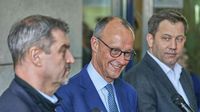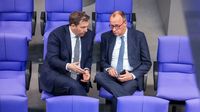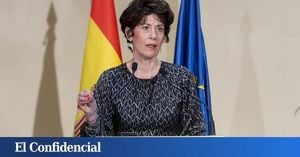After a marathon session of coalition negotiations lasting 13 hours, the Union and the SPD have postponed their discussions without reaching a final agreement. The negotiations, which took place at the CDU headquarters in Berlin, will resume on April 9, 2025, at 9:30 AM, with the goal of finalizing the coalition agreement by midday.
The urgency of the negotiations stems from the international economic situation, particularly the recent turmoil in global markets, which has intensified the pressure on German politicians to form a stable government. CDU leader Friedrich Merz emphasized the need for swift action, stating, "We need tax cuts for companies and citizens, a noticeable reduction in bureaucracy, lower energy prices, and a stabilization of the costs for the social security systems."
Throughout the day, negotiators from both parties expressed optimism about reaching a consensus. SPD leader Lars Klingbeil and CDU chief Merz were seen as key figures in the discussions, along with CSU head Markus Söder and SPD co-chair Saskia Esken. After the chief negotiators concluded their talks in the evening, the four party leaders met privately to iron out the final details of the coalition agreement.
Despite the positive atmosphere, significant disagreements remain on critical issues such as taxation and pensions. The SPD is advocating for higher taxes on high-income earners, while the Union opposes this and seeks to abolish the solidarity tax (Soli) entirely. A potential compromise being discussed involves eliminating the Soli tax in exchange for slight increases in the top tax rate (currently at 42%) and the wealth tax rate (currently at 45%).
Another contentious point is the pension system. The SPD proposes to fix the pension level at 48% of the average salary, which would lead to increased contributions for workers. The Union, however, is against a rigid pension level, arguing that it could impose undue financial burdens.
As the negotiations continue, the political landscape remains tense. A recent poll indicated that a majority of Germans view Merz as unsuitable for the role of Chancellor, with only 32% expressing confidence in his leadership. This sentiment is particularly pronounced in East Germany, where 63% of respondents believe Merz is unfit for the position.
In light of these challenges, the CDU's youth wing, the Junge Union, has threatened to oppose the coalition agreement unless it aligns with their vision for a political shift. Johannes Winkel, the head of the Junge Union, stated, "The CDU must not sign a coalition agreement without a change in policy. If we enter a coalition without the overdue and promised political change, it would cause significant harm to the country."
As the clock ticks down to the next round of talks, the stakes are high. The coalition agreement must not only satisfy the demands of both parties but also address the expectations of the German public, who are eager for a stable government capable of navigating the current economic challenges.
Looking ahead, if an agreement is reached, the new coalition could be presented to the public at a press conference scheduled for April 9, 2025, at noon. Following this, Merz is expected to be elected as the new Chancellor by the Bundestag on May 7, 2025.
The negotiations highlight the complexities of coalition politics in Germany, where differing party ideologies must be reconciled to form a functioning government. The outcome of these discussions will not only shape the immediate future of German politics but could also have long-lasting implications for the country's economic policies and social welfare systems.
As both parties prepare for the next round of negotiations, they must balance their internal party pressures with the need to present a united front to the electorate. The coming hours will be crucial in determining whether the Union and SPD can emerge from these talks with a coalition agreement that satisfies their respective bases while addressing the pressing issues facing the country.










